The Survivors
The old cliché god-like-alien meets the new cliché of an entire episode of Troi-in-agony
A distress call! It seems a Federation colony has been attacked... could it be the Borg? No, nothing so forward-looking as that, although given that the planet is completely destroyed it's mysterious that nobody thinks to mention the Borg as a possibility. Equally mysterious is why Dr Crusher is on the bridge, perched to the side of Troi.
Why is she here? She's not a member of the bridge crew, and there's literally nowhere sensible for her to sit. Perhaps she's come to admire Troi's new dress.
Anyway, when they get to the planet, it's been utterly destroyed - except for one single house. Riker leads an away team to meet the survivors, Kevin and Rishon Uxbridge, and falls prey of an animal trap. Unabashed, he negotiates with the locals while dangling from his feet - now that's the power of a good beard right there!
The survivors seem almost suspiciously innocuous... indeed, the only sign that something is rotten in the state of Rana IV is the music box, and the immense distress it causes Troi.
Suddenly a spaceship arrives - it's massive! We know this primarily because Wesley tells us so. Then it runs away, and the Enterprise-D gives chase... Picard smells a rat, and returns to confront the Uxbridges. They have tea together. How nice. Even Worf says so. There's a far bit of this rat-and-mouse nonsense, before Picard calls Kevin Uxbridge's bluff and reveals that he is secret yet another god-like entity, a Douwd, who have Q like powers but aren't Q or half as interesting as Q. It seems the whole episode was an attempt for him to atone for his guilt about angrily exterminating an entire species. Because genocide is okay as long as you feel really bad about it.
Words
"Good tea. Nice house."
This episode is immortal for this line alone, which adorns an enormous number of T-shirts, and has inexplicably stood out from every other thing Worf said. Don't get me wrong, it's a great line, and perfectly delivered by Michael Dorn. But quite why this would become such an iconic moment is difficult to ascertain. The fact that it is only four words, however, but embeds the traditional-bound decorum that makes Worf who he is, surely must count to the credit of writer, Michael Wagner, who wrote three stories in this season and was head writer for the first four episodes aired.
It is a shame, though, that this story boils down to bringing another god-like entity out of the big box of plot devices. If this had been mounted as a sideways Q story, perhaps it would have felt more of a piece with the rest of TNG.
Acting Roles
This is the first of a great many episodes in which Marina Sirtis is tasked with being wracked with pain for almost an entire episode. On the plus side, this is a different way of using her empathic powers, but on the minus side it reduces Troi to mere plot device. Sirtis' performance is okay, but it’s buttressed by clever use of music to give it greater impact.
More impressive is Michael Dorn's Worf, who is absolutely brilliant in the first three acts of this story. Understated yet focussed, a great deal of his role in this episode is precisely what Denise Crosby's Yar was asked to do - deliver battle exposition. Yet the writers give Worf so much texture between these scenes that Dorn is never treated as shabbily as Crosby. To a great degree, the fact he is a Klingon is what makes the difference... that, and the fact the writing is just that much better in season three than in season one.
This is one of those rare episodes where the guest stars are genuinely excellent.
Anne Haney is strangely compelling as the warm and affable Rishon Uxbridge, and her performance is central to making the story work - most especially in the final act, as she struggles to understand what's happening. Haney had a brilliant career, with small roles in big films like Mrs Doubtfire and Liar Liar, not to mention a recurring role as a judge in L.A. Law.
Haney is perfectly paired with John Anderson's Kevin Uxbridge, who projects his quiet agony of conscience brilliantly in the final act, and is marvellously irascible in the earlier scenes.
Anderson almost turned down the role, as his own wife had passed away a year before this episode was filmed... in the end, he took the job, and perhaps worked through some of his grief in doing so. Like Haney, Anderson had a lengthy career, with small roles in big films like Hitchcock's Psycho, and plenty of TV appearances too, perhaps most memorably as MacGyver's Grandfather in Richard Dean Anderson's loveable nonsense show.
It's not all good, alas. Picard's role in this episode is clunky and hard to believe. Patrick Stewart is as watchable as ever, but his character's behaviour is difficult to take seriously. Picard reaches perfect certainty as to what happened on little more than a hunch, and sadly no part of his role in this story is credible. It a failure of the script, not the actor, but it's still a disappointment all the same.
Models, Make-up, and Mattes
Get a load of Troi's new dress! The new head of wardrobe certainly didn't rest on their laurels with the swanky new uniforms.
We also get a new studio miniature... and my goodness does this one have a long service record!
Introduced as a Husnock battleship in this episode, we will see it again six more times in TNG, eight times in DS9, five times in Voyager, and even twice in that other show in the original production sequence. Each time it appears, it is heavily modified. This one wasn't built by the regular supplier, Greg Jein, as he was working on The Hunt for Red October and Star Trek V: The Final Frontier and so couldn't take on another job. Instead, Tony Meininger was invited to build a miniature for this episode, having previously made the nebula effect in the opening credits. He would go on to play a crucial role in the Trek franchises, perhaps most significantly building the model of the Defiant for DS9. I'm not a big fan of the Husnock battleship model, but Meininger's work gets better and better the more he worked on Trek.
But the absolute star of this episode for me is the establishing shot of the Uxbridge's house, which pans across a Syd Dutton matte painting to reveal the sole surviving house.
It's essential to the episode, since it sets up the mystery, and it's beautifully simple yet effective. To make it work, the location work required a house with a tall hedgerow - otherwise all the shots outside would have required expensive composition. They found such a place in Malibu Beach, and Dutton reproduces it perfectly in his painting. You have to look very closely at the line of bushes to see the difference, although you can also make out the brushwork on the house.
This is the kind of brilliant SFX work that so frequently goes unnoticed - how often do we stop to take note of the way a location scout made a wonderful matte painting shot possible...? Whatever else you can say about this episode, it's beautifully put together.









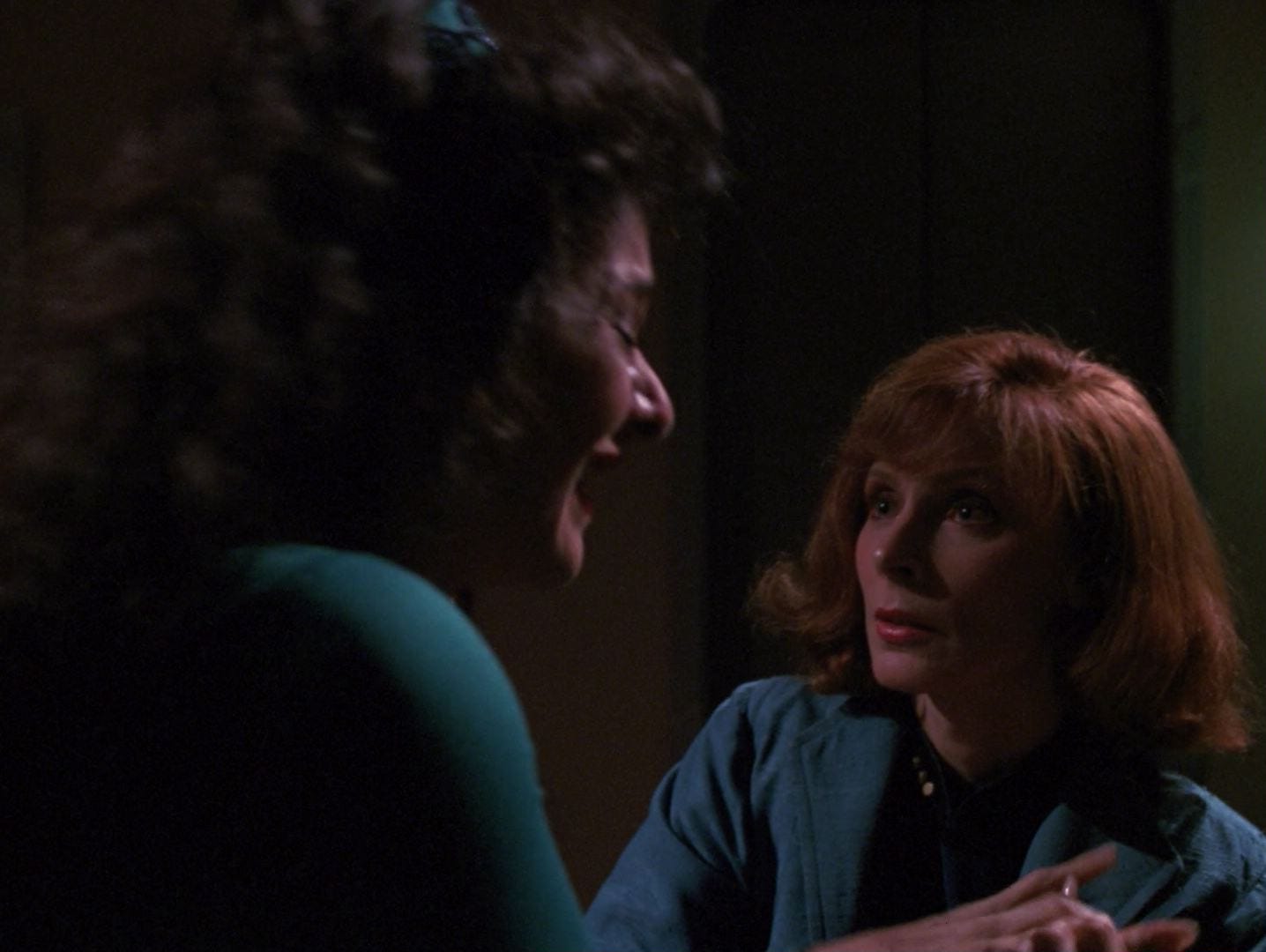
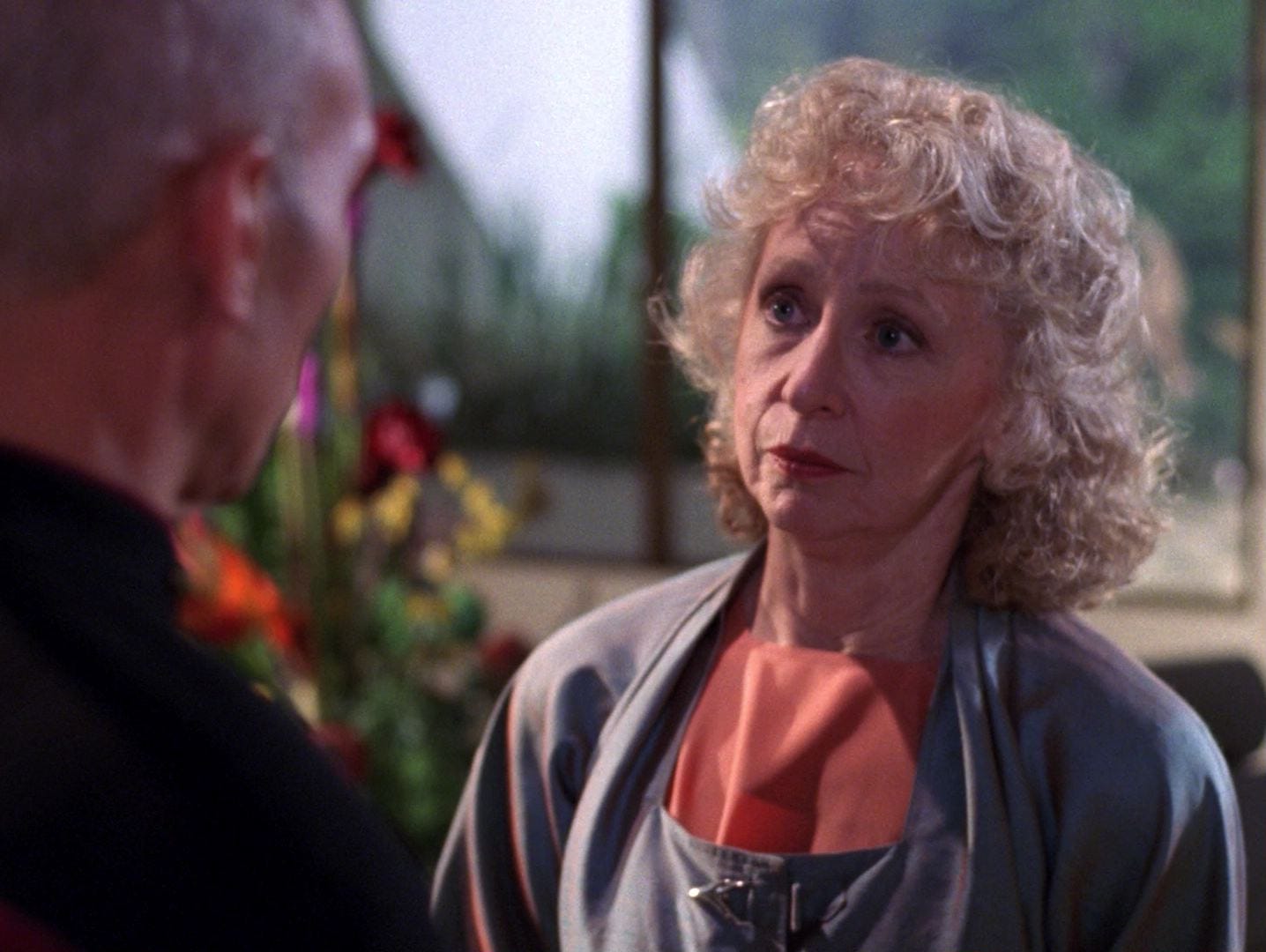

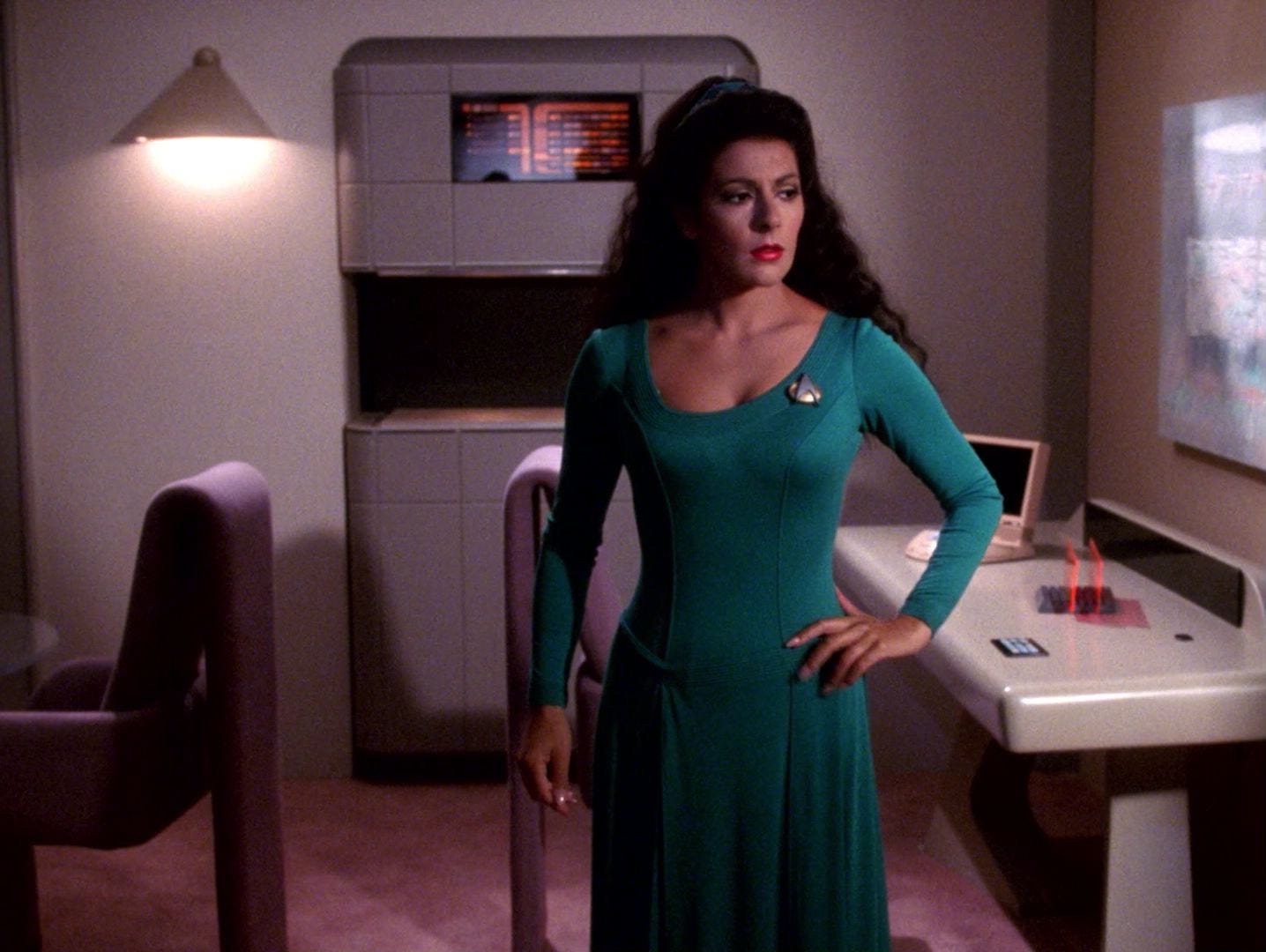
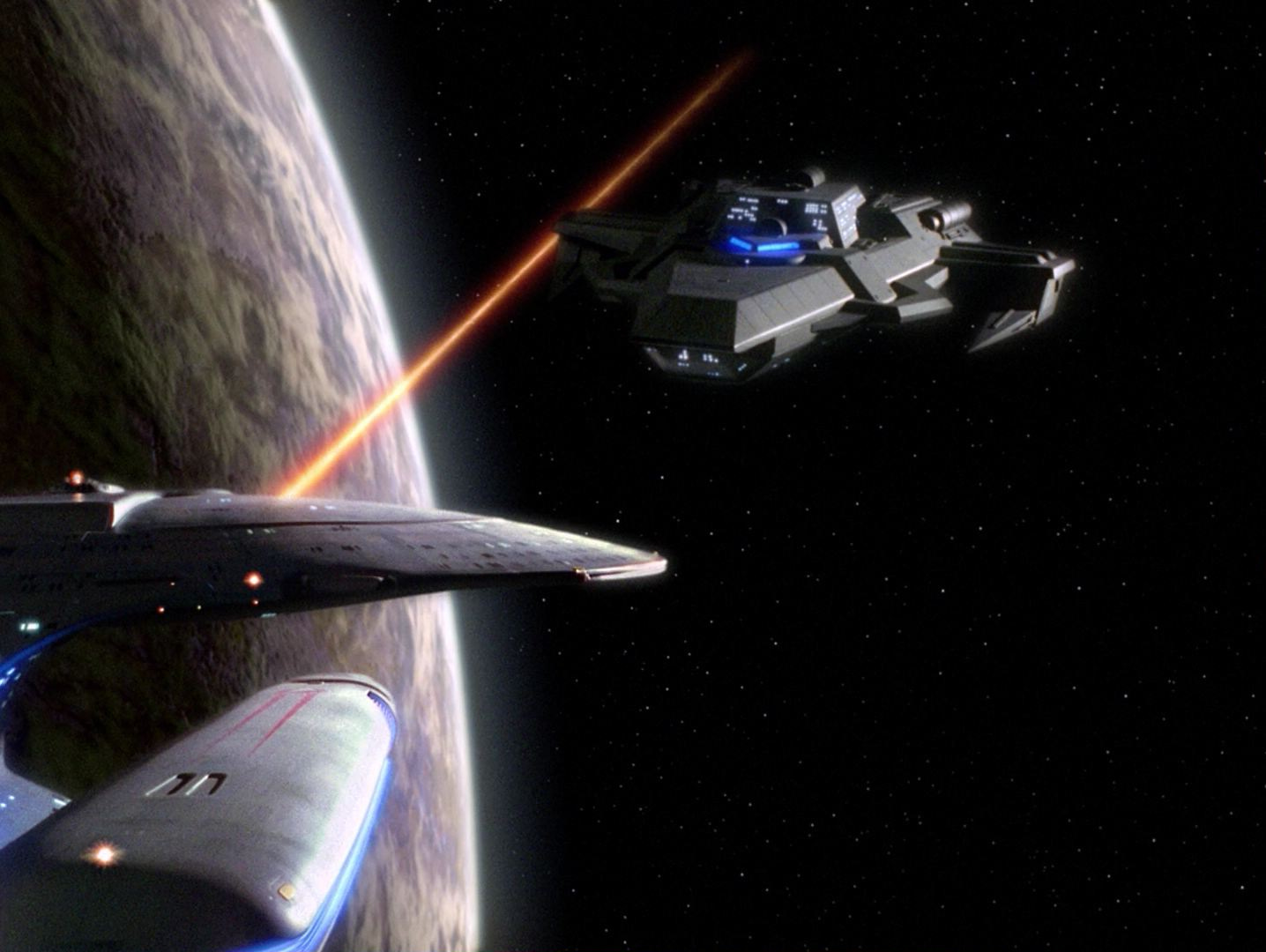

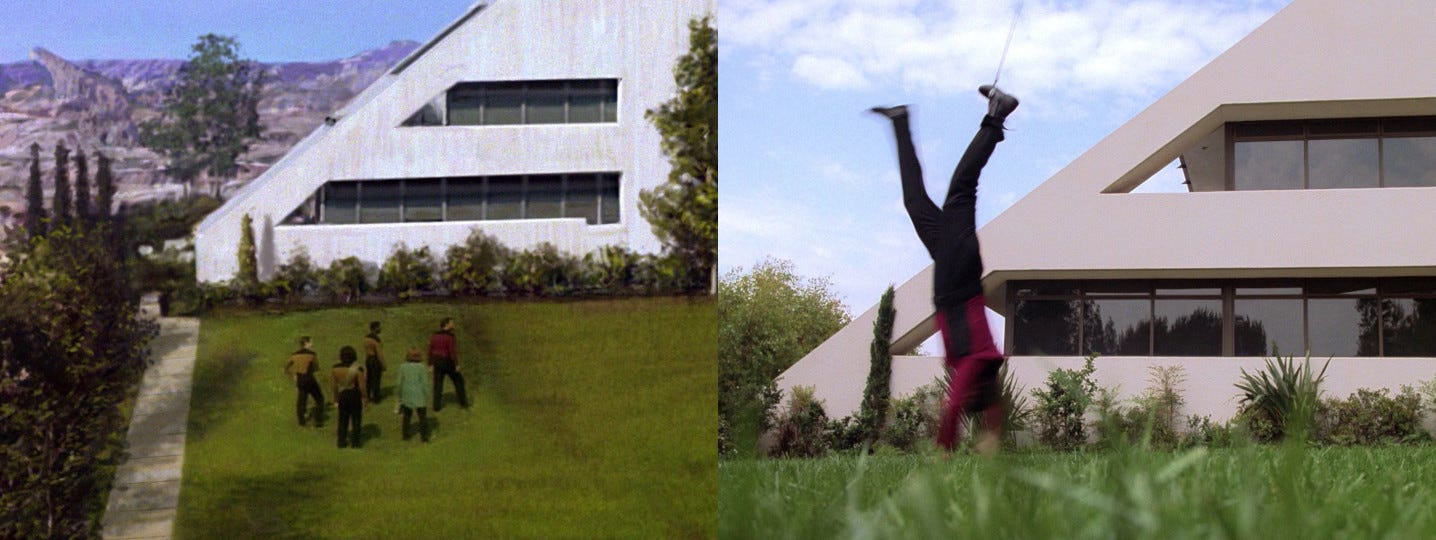
That catchy tune which sneakily invades your unsuspecting mind and lingers.... We've all been a bit like Troi here once in a while - haven't we?
Anderson's car salesman scene in 'Psycho' is such a memorable moment in Hitchcock's classic. And in Rod Serling's masterwork , 'Twilight Zone', he plays alongside James Coburn in 'The Old Man In The Cave'
I honestly wait for the Riker foot trapping scene and relish it - lol - simple little TNG pleasures....